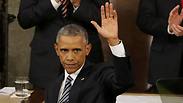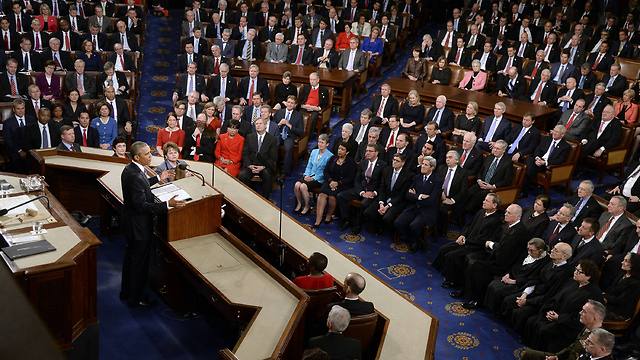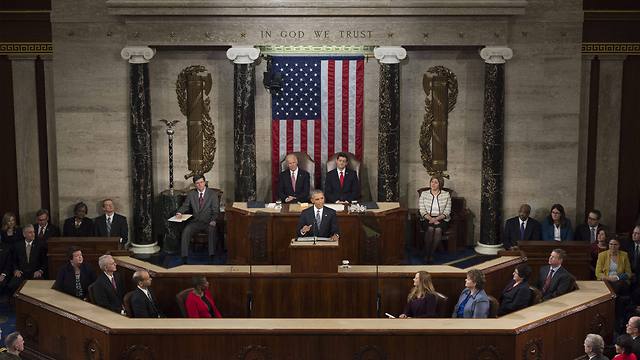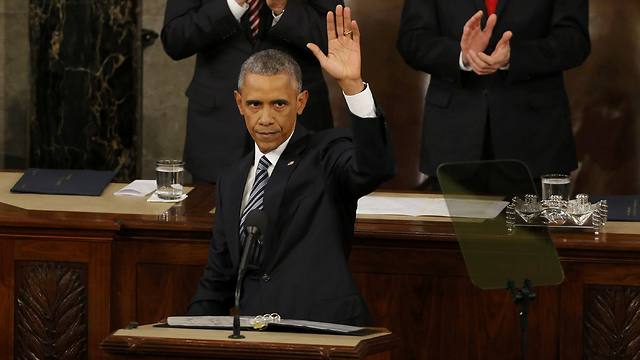
Obama: When you come after Americans, we go after you
In his final State of the Union speech, the US president vows a robust campaign to 'take out' ISIS, saying 'If you doubt America’s commitment to see that justice is done, ask Osama bin Laden.'
US President Barack Obama took aim on Tuesday at Republican presidential front-runner Donald Trump and accused critics of playing into the hands of Islamic State in a speech meant to cement his legacy and set a positive tone for his final year in office.
Obama, delivering his last annual State of the Union speech to Congress as president, vowed a robust campaign to "take out" the Islamic State group.
"If you doubt America’s commitment — or mine — to see that justice is done, ask Osama bin Laden. Ask the leader of al-Qaeda in Yemen, who was taken out last year, or the perpetrator of the Benghazi attacks, who sits in a prison cell. When you come after Americans, we go after you. It may take time, but we have long memories, and our reach has no limit," he said.
While acknowledging that al-Qaeda and Islamic State posed a direct threat to Americans, he said comparing the effort to defeat the militants who control swaths of Iraq and Syria to World War Three gave the group just what it wanted.
"Masses of fighters on the back of pickup trucks, twisted souls plotting in apartments or garages: they pose an enormous danger to civilians; they have to be stopped. But they do not threaten our national existence," Obama said.
"As someone who begins every day with an intelligence briefing, I know this is a dangerous time," the president admitted. "But that’s not because of diminished American strength or some looming superpower. In today’s world, we’re threatened less by evil empires and more by failing states. The Middle East is going through a transformation that will play out for a generation, rooted in conflicts that date back millennia."
Obama, whose 2008 victory was driven partially by his opposition to the Iraq war, said the United States could not serve as policeman of the world.
"We also can't try to take over and rebuild every country that falls into crisis, even if it's done with the best of intentions," he said. "It's the lesson of Vietnam; it's the lesson of Iraq; and we should have learned it by now."
The president's words were unlikely to satisfy Republicans, as well as some Democrats, who say he underestimates the Islamic State's power and is leaving the US vulnerable to attacks at home.
Mindful of the scant prospect for major legislative action in an election year, Obama avoided the traditional litany of policy proposals found in State of the Union addresses in which presidents outline their agenda for the coming year.
While Obama did not directly call out Republicans, he sharply, and at times sarcastically, struck back at rivals who have challenged his economic and national security stewardship.
In his most pointed swipe at the Republican candidates running to succeed him, Obama warned against "voices urging us to fall back into tribes, to scapegoat fellow citizens who don't look like us or pray like us or vote like we do or share the same background."
He called for leaders to "fix" US politics and criticized candidates such as Trump for using anti-Muslim rhetoric that betrayed American values.
"When politicians insult Muslims ... that doesn't make us safer," he said, drawing applause from the crowd in the House of Representatives chamber. "It's just wrong. It diminishes us in the eyes of the world. It makes it harder to achieve our goals."
Trump, whom Obama did not mention by name in his speech, is leading the Republican field ahead of the Nov. 8 election to pick the next president.
The billionaire businessman, citing national security concerns, has called for a temporary ban on Muslims entering the United States and a wall on the US border with Mexico to stop the flow of illegal immigrants, ideas the White House strongly opposes.
Obama sought to contrast his more optimistic view of America's future with those of the Republican candidates trying to replace him.
He said it was "fiction" to describe the country as being in economic decline.
"All the talk of America's economic decline is political hot air," Obama said. "So is all the rhetoric you hear about our enemies getting stronger and America getting weaker."
"The United States of America is the most powerful nation on Earth. Period. It's not even close," he said.
"No nation dares to attack us or our allies because they know that’s the path to ruin. Surveys show our standing around the world is higher than when I was elected to this office, and when it comes to every important international issue, people of the world do not look to Beijing or Moscow to lead — they call us," he added.
Obama's address to lawmakers, Cabinet members and Supreme Court justices was one of his last remaining chances to capture the attention of millions of Americans before the November election. The next president will take office in January 2017.
Trump, in a posting on Twitter, called the speech "boring" and lacking in substance. "New leadership fast!"
Meanwhile, House Speaker Paul Ryan, assuming the speaker's traditional seat behind the president for the first time, said Obama's "lofty platitudes and nostalgic rhetoric may make for nice soundbites, but they don't explain how to" solve problems.
But South Carolina Governor Nikki Haley, who delivered the Republican response to Obama's address, took her own jab at Trump and other less moderate candidates in her party.
"During anxious times, it can be tempting to follow the siren call of the angriest voices. We must resist that temptation," said Haley, the daughter of Indian immigrants. "No one who is willing to work hard, abide by our laws, and love our traditions should ever feel unwelcome in this country," she said.
Obama's address came as 10 sailors aboard two US Navy boats were taken into Iranian custody. Iran told the United States the crew members would be "promptly" returned, US officials said. The event gave Republicans further fodder to criticize Obama's nuclear deal with Tehran.
Obama did not address the issue in his speech. The White House expects the situation to be resolved quickly.
Legacy, regret
Obama, who is constitutionally barred from a third term, stuck to themes he hopes will define his legacy, including last year's nuclear pact with Tehran.
Focused on his own legacy, Obama ticked off a retrospective of his domestic and foreign policy actions in office, including helping lead the economy back from the brink of depression, taking aggressive action on climate change and ending a Cold War freeze with Cuba.
Obama was frank about one of his biggest regrets: failing to ease the persistently deep divisions between Democrats and Republicans. The Republican-controlled Congress that Obama stood before Tuesday night is hostile to his ideas and angry about his executive orders on issues from guns to immigration.
As for political disagreement, Obama conceded, "The rancor and suspicion between the parties has gotten worse instead of better. There's no doubt a president with the gifts of Lincoln or Roosevelt might have better bridged the divide, and I guarantee I'll keep trying to be better so long as I hold this office."
He noted areas where compromise was possible with Republicans in Congress including criminal justice reform, trade and poverty reduction.
To help "fix" US politics, Obama pressed for an end to "gerrymandering," the practice of drawing voting districts in ways that gives advantage to a particular party; reducing the influence of "dark money" or political spending in which funding sources do not have to be disclosed; and making voting easier.
He called for lawmakers to ratify a Pacific trade pact, and said he had tasked Vice President Joe Biden, whose son died last year of cancer, to lead an effort to find a cure for the disease.
The president noted some outstanding promises from his own 2008 campaign. He pledged to continue to work to close the US prison at Guantanamo Bay, Cuba, and called on Congress to lift the embargo on the Communist-ruled island nation.
Obama is eager for a Democrat to win the White House to preserve his legacy, but anger over his policies and fears about security threats have helped push non-traditional candidates to the fore in the Republican and, to a lesser extent, the Democratic races to succeed him.
Trump and Senator Ted Cruz of Texas are at the top of the Republican field, while self-described "socialist" Bernie Sanders, a US senator from Vermont, is giving former Secretary of State Hillary Clinton tough competition in early voting states for the Democratic primary contest.
The president himself appeared to get momentarily caught up in the emotion of the moment. As he walked toward the exit after his hour-long speech, he turned back to the crowded House chamber and said, "Let me take one more look at this thing."















